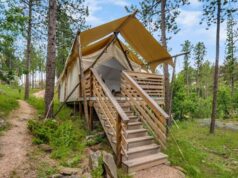 The most recent information from the U.S. Green Building Council (USGBC) has 73 lodging properties and convention centers having achieved LEED certification, with 1,031 lodging projects and convention centers registered and working towards certification. Twenty-four hotels were certified in 2009 and this year 32 hotels already have completed certification. Marriott is the first in the industry to launch a LEED certified hotel prototype (for its Courtyard brand). It has been preapproved by USGBC as part of its LEED volume program; also Marriott has set a goal to have 300 LEED certified hotels in its system by 2015.
The most recent information from the U.S. Green Building Council (USGBC) has 73 lodging properties and convention centers having achieved LEED certification, with 1,031 lodging projects and convention centers registered and working towards certification. Twenty-four hotels were certified in 2009 and this year 32 hotels already have completed certification. Marriott is the first in the industry to launch a LEED certified hotel prototype (for its Courtyard brand). It has been preapproved by USGBC as part of its LEED volume program; also Marriott has set a goal to have 300 LEED certified hotels in its system by 2015.
Starwood’s Element is the first hotel brand to mandate that hotels seek LEED accreditation. A new independent upscale LEED certified hotel brand called Adoba Eco Hotel & Suites has been launched by Atmosphere Hospitality Management, focused on the triple bottom line and is showing owners the increased value of a green hotel. LEED certification in the hospitality industry is no longer just a trend; it’s a competitive reality.
The LEED Rating Systems Typically Used
The LEED NC (New Construction and Major Renovation) Rating System is designed to guide and distinguish new construction and major renovation projects. For more information on LEED NC, visit the USGBC LEED NC Rating System Web page.
The LEED EB (Existing Building Operations and Maintenance) Rating System helps building owners and operators measure operations, improvements and maintenance on a consistent scale, with the goal of maximizing operational efficiency while minimizing environmental impacts. LEED for Existing Buildings addresses whole-building cleaning and maintenance issues including chemical use, recycling programs, exterior maintenance programs, and systems upgrades. For more information, visit the USGBC LEED EB Rating System Web page.
Challenges Related to LEED
Hospitality properties have a wide variety of facility types including huge conference hotels, casino hotels, boutique hotels, resorts, timeshare and hotel/condos to name a few and have distinctive complexities related to creating a high performance building including: convention facilities, food and beverage operations, on-site amenities, laundry operations, frequent renovation cycles, and guest use habits. All of these issues make creating a green hotel more complex, however there are many hotels that have forged the path and created a roadmap. Many of these properties can be found on USGBC’s website under Case Studies and can provide a great source of information. If you are considering pursuing LEED certification, consult with a firm that has completed a number of LEED certified projects already; they will more than pay for their fee in cost savings.
What is Coming Next?
USGBC is utilizing hospitality industry experts from USGBC member companies to develop specific modifications to LEED for hospitality projects that recognize the distinctive opportunity and challenges related to hotel buildings. USGBC utilizes a consensus based process for these modifications that includes a transparent committee structure, technical advisory groups, stakeholder comments, member ballot and appeals process, which all takes some time but the outcome is a fair and balanced result. Visit USGBC’s website often to stay informed of the progress on these modifications.
Why Pursue LEED Certification?
In the tourism sector some of the statistics related to the market share for ecotourism are staggering. The Trip Advisors 2010 Travel Trends Survey found 22 percent of travelers expect to be more environmentally conscious in their travel decisions in 2010 than they were in 2009. In 2009, 34 percent of U.S. respondents said they will visit an environmentally-friendly hotel or resort. Thirty-two percent consider their carbon footprint when traveling, and as a result, 44 percent of these travelers choose to stay at green hotels. A hotel having green policies also factors into 33 percent of travelers’ booking decisions. With one-third of the traveling public considering your hotel’s level of sustainability, you cannot ignore green or “green wash.”
Even business travelers are considering sustainability as a factor for their booking decisions. The American Express travel planners recently surveyed their business travel clients and found that one of the top three concerns was the environment. Even with budget cuts and rough economic times, they found that corporate clients were including sustainability in their booking decisions, particularly for hotel rooms.
Event planners are increasingly requiring green statements from hotels, and will soon be using a uniform green standard. Expected to be released sometime in November is the APEX/ASTM Green Meetings and Events standard. It will help event and meeting planners with their RFPs. You can currently review the final draft document at APEX/ASTM Green Meetings and Events standard. The Convention Industry Council’s Accepted Practices Exchange (APEX), EPA, ASTM International and Green Meeting Industry Council (GMIC) have been working on developing these standards for two years through discussions, work groups, regional meetings and reviews by more than 200 industry volunteers and professional standards writers.
Also on the horizon is the International Organization for Standards (ISO) ISO 20121, which is targeted to become an internationally recognized green meeting standard in time for the London 2012 Olympic Summer Games. This standard was based on the British Standard (BS 8901). There are 30 countries involved in the development of ISO 20121 and several liaison bodies such as the Meeting Professionals International (MPI). Any of these green meetings checklists can be of help to any hotelier trying to increase their green meeting convention business.
First Steps to Take
There are numerous places to go for information on green meetings and hotels. Start with the EPA Green Hotel Initiative, which will provide you with connections to the Green Meeting Industry Council, Meeting Professionals International (MPI), International Association of Convention and Visitors Bureaus—Sustainable Tourism, Green Hotel Initiatives, Green Hotels Standards, and Other Related EPA Programs. Industry organizations such as the American Hotel and Lodging Association (AHLA) have developed programs; the AH&LA Green Resource Center can act as a beginner’s guide. Another avenue of assistance could be a green lodging program in your state or city. Currently there are green lodging programs in approximately 30 states and two cities; see if you have a green lodging program in your state or city (click here).
Another option is starting with the USGBC Green Venue Selection Guide; it will provide not only a great road map for green meetings but also draw a parallel to the LEED certification requirements. If your plan is for future LEED certification, this may be your best avenue. In getting any green initiative going make sure you have a green team to drive the initiative into action. Your local USGBC chapter may have a Hospitality Advocacy Group that can assist you with local resources. To find a local USGBC chapter, go to USGBC: About Chapters.
Just remember that the knowledgeable guest’s expectation is continued growth toward a more sustainable property and business. Any path and timeframe that you take toward LEED certification is a worthwhile experience for your property, staff, guests and the environment.
Dina M. Belon is a principal and an owner of RUSH Hospitality, a sustainable hospitality renovation company, providing design, procurement and construction services. Dina is a licensed interior designer in the state of Florida, and a LEED Accredited Professional. She is an active member of the U.S. Green Building Council. Additionally, Dina is very involved in NEWH (The Hospitality Industry Network), chairing the Sunshine Chapters Sustainable Committee, and as a member of the International Sustainable Hospitality Committee, which helps educate the hospitality community on sustainability. Dina is also a member of the ARDA (American Resort Development Assn.) Construction and Design Committee and the Sustainability Task Force. She can be reached at dbelon@rushhospitality.com.







